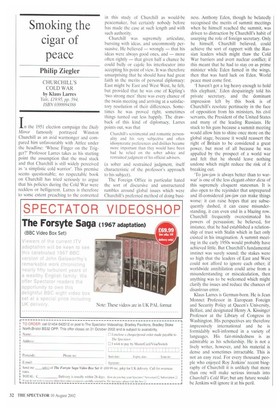Smoking the cigar of peace
Philip Ziegler
CHURCHILL'S COLD WAR by Klaus Larres Yale, £19.95, pp. 594, ISBN 0300094388 In the 1951 election campaign the Daily Mirror famously portrayed Winston Churchill as an avid warmonger and compared him unfavourably with Attlee under the headline: 'Whose Finger on the Trigger?' Professor Larres takes as his starting point the assumption that the mud stuck and that Churchill is still widely perceived as 'a simplistic cold warrior'. This premise seems questionable; no respectable book on Churchill has tried seriously to argue that his policies during the Cold War were reckless or belligerent. Larres is therefore to some extent preaching to the converted
in this study of Churchill as would-be peacemaker, but certainly nobody before has made the case at such length and with such authority.
Churchill was supremely articulate, bursting with ideas, and uncommonly persuasive. He believed — wrongly — that his ideas were always good ones, and — more often rightly — that given half a chance he could bully or cajole his interlocutor into accepting his point of view. It was therefore unsurprising that he should have had great faith in the merits of personal diplomacy: East might be East and West West, he felt, but provided that he was one of Kipling's two strong men' there was every chance of the twain meeting and arriving at a satisfactory resolution of their differences. Sometimes he was proved right, sometimes things turned out less happily. The drawback of this kind of diplomacy, Larres points out, was that
Churchill's sentimental and romantic personality and his very subjective and often idiosyncratic preferences and dislikes became more important than they would have been had he relied on the sober advice and restrained judgment of his official advisers.
(a sober and restrained judgment, itself characteristic of the professor's approach to his subject).
The Foreign Office in particular hated the sort of discursive and unstructured rambles around global issues which were Churchill's preferred method of doing busi ness. Anthony Eden, though he belatedly recognised the merits of summit meetings when he himself reached the summit, was driven to distraction by Churchill's habit of usurping the role of foreign secretary. Only he himself, Churchill believed, could achieve the sort of rapport with the Russian leaders which might thaw the Cold War barriers and avert nuclear conflict; if this meant that he had to stay on as prime minister while Eden fumed in the wings, then that was hard luck on Eden. World peace must come first.
'I haven't got a log heavy enough to hold this elephant,' Eden despairingly told his private secretary, and the dominant impression left by this book is of Churchill's resolute pertinacity in the face of opposition from his ministers, his civil servants, the President of the United States and many of the leading Russians. He stuck to his guns because a summit meeting would allow him to shine once more on the global stage, because it would reassert the right of Britain to be considered a great power, but most of all because he was appalled by the prospect of a world war and felt that he should leave nothing undone which might reduce the risk of it breaking out.
`To jaw-jaw is always better than to warwar' is one of the less elegant obiter dicta of this supremely eloquent statesman. It is also open to the rejoinder that unprepared and ill-considered jaw-jaw can make things worse: it can raise hopes that are subsequently dashed, it can cause misunderstanding, it can even end in a blazing row. Churchill frequently overestimated his powers of persuasion; he believed, for instance, that he had established a relationship of trust with Stalin which in fact only existed in his imagination. A summit meeting in the early 1950s would probably have achieved little. But Churchill's fundamental instinct was surely sound; the stakes were so high that the leaders of East and West could not afford to ignore each other; if worldwide annihilation could arise from a misunderstanding or miscalculation, then anything was to be welcomed which might clarify the issues and reduce the chances of disastrous error.
Klaus Larres is German-born. He is Jean Monnet Professor in European Foreign and Security Policy at Queen's University, Belfast, and designated Henry A. Kissinger Professor at the Library of Congress in Washington. His perspectives are therefore impressively international and he is formidably well-informed in a variety of languages. His fair-mindedness is as admirable as his scholarship. He is not a lively writer, however, and his material is dense and sometimes intractable. This is not an easy read. For every thousand people who enjoyed Roy Jenkins' recent biography of Churchill it is unlikely that more than one will make serious inroads into Churchill's Cold War; but any future wouldbe Jenkins will ignore it at his peril.


























































 Previous page
Previous page